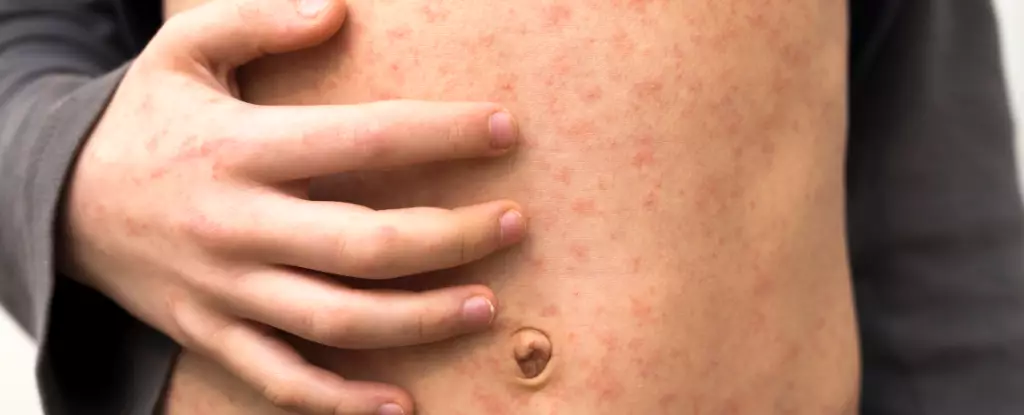In a troubling turn of events, the measles outbreak that commenced in west Texas in late January 2025 has surged to an alarming level. As of March 28, the infection has affected 400 residents in Texas and spread to neighboring states such as New Mexico and Oklahoma, which report an additional 50 cases. Public health experts express grave concerns, saying that these numbers are likely understated. The prospect of a larger resurgence of measles is not merely speculation; it is a genuine crisis intensifying across the United States. Recent travel exposures have been reported, raising awareness of how easily this virus can circulate in public spaces like airports and trains, creating a network of potential transmissions.
To many, measles may seem like an outdated concern, a relic of a time before successful vaccination initiatives took hold. However, the resurgence of this highly contagious disease underscores a staggering public unawareness of how quickly and insidiously it can spread. This epidemic demands our immediate attention and action.
The Pervasive Threat of Measles
The severity of measles cannot be overstated. Within the first few months of 2025, 14% of those infected with measles required hospitalization—a marked decrease from last year’s staggering 40%. These numbers reflect a disturbing trend that some attribute to increased public resistance to vaccination. The reality is that measles is not just a benign childhood illness; it harbors serious repercussions that can lead to irreversible damage. The risks of the disease include pulmonary complications, such as viral pneumonia, which affects approximately one in every 20 children diagnosed with measles. This particular form of pneumonia serves as the leading cause of death linked to measles, tragically illustrating the need for heightened vigilance.
One cannot discuss measles without highlighting its extraordinary contagion factor. Statistics reveal that a single infected person can transmit the virus to 9 out of 10 unvaccinated individuals in close proximity. This chilling fact situates measles among the most transmissible pathogens known to humans. On the other hand, the measles vaccine, administered in a two-dose regimen, boasts a striking 97% efficacy rate, rendering it one of the foremost preventative measures against this debilitating illness.
Your Immune System’s Silent Battle
Measles does not just challenge our public health; it wages a silent war against the immune system itself. Upon entering the body, the virus binds to specific proteins on cell surfaces, initiating a harmful replication process that ultimately ends in cellular destruction. This destructive path starts in the upper respiratory tract and can devastate lung function. The ensuing damage can lead patients down a treacherous road filled with severe respiratory challenges, complicating their recovery and significantly raising their risk of hospitalization.
Another particularly harrowing aspect of measles is its effects on the nervous system. Here we find a dual threat: acute infection of the brain can occur in approximately 1 in 1,000 cases, and encephalitis—brain inflammation—can develop 2 to 30 days post-infection. The ramifications can be catastrophic, resulting in permanent neurological impairments such as blindness and hearing loss. Strikingly, a lesser-known consequence is “subacute sclerosing panencephalitis,” a progressive dementia that can manifest years after recovery from measles. This terrifying condition poses an enhanced risk to those infected at a young age, adding to the urgency of vaccination.
The Vaccination Debate and Public Perception
The societal debate surrounding vaccination intensifies in light of such grim realities, notably the misconception that measles is a minor ailment relegated to childhood. This prevailing attitude struggles against a background of education, as many Americans under 50 lack firsthand experience with the disease. The public must recognize that vaccination is not merely an option; it is an imperative pathway to safeguarding not just individual health, but the well-being of entire communities.
Despite ongoing research into possible therapies for severe measles—such as antibody treatments—the most effective course of action remains clear: vaccination. Public health advocates must refocus their efforts on educating communities regarding the critical importance of the measles vaccine. Only through collective action can we hope to arrest the growing concern over measles—a disease that could easily be relegated to the history books if society embraces vaccination with the urgency it deserves.
Given the contagious nature of measles and its potential for severe health consequences, it is essential to foster an environment where vaccination is viewed not just as a personal choice, but as a civic responsibility. Individuals owe it to themselves and each other to prioritize public health, ensuring that measures are taken to protect future generations from the risk of this devastating infectious disease.

